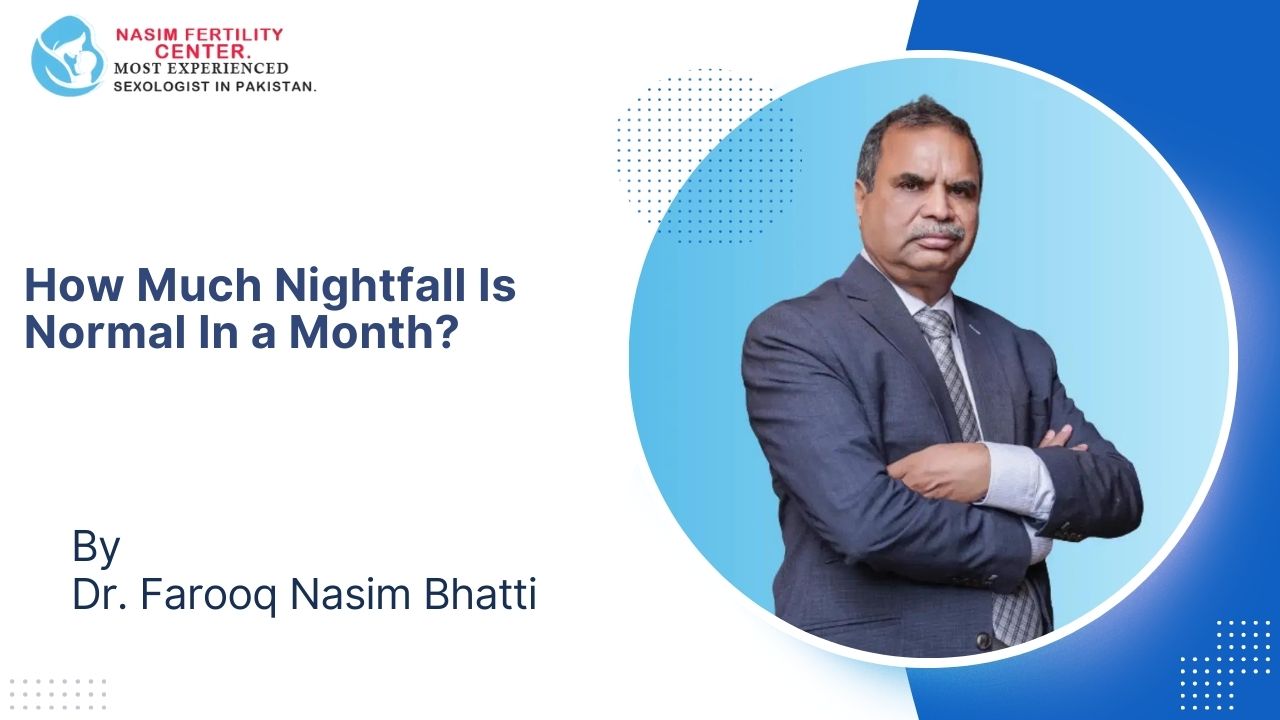
Nightfall, also known as nocturnal emission or wet dreams, is a common experience among men, particularly during adolescence and young adulthood. It involves involuntary ejaculation during sleep. While it’s a natural physiological occurrence, many individuals have concerns about its frequency and whether it indicates an underlying health issue.
As Dr. Farooq Nasim Bhatti, Pakistan’s first and only recognized medical sexologist, explains, understanding nightfall is vital to addressing misconceptions and seeking appropriate treatment when needed. This article provides an in-depth exploration of nightfall, its causes, implications, and expert recommendations.
Worried About Frequent Nightfall? Don’t Ignore the Signs
Understand what’s normal and when it’s time to seek expert help. Talk to Dr. Farooq Nasim Bhatti for a personalized solution.

Causes and Reasons for Nightfall in Men
Nightfall occurs due to various physiological and psychological factors. While it is a normal process, excessive occurrences might indicate underlying issues. Here are the primary causes:
Natural Hormonal Changes
During adolescence and early adulthood, testosterone levels surge, leading to increased sexual energy. This hormonal fluctuation can result in spontaneous nocturnal emissions as the body adjusts to these changes.
Lack of Sexual Activity
In men who are not sexually active, the body finds natural ways to release excess semen. Nightfall acts as a physiological mechanism to maintain reproductive health.
Sexual Thoughts and Fantasies
Men frequently exposed to erotic content or engaging in vivid sexual fantasies may experience heightened sexual stimulation, triggering nightfall episodes.
Dietary Habits
Certain foods rich in aphrodisiacs or stimulants may increase sexual energy, indirectly contributing to nightfall.
Stress and Anxiety
Psychological stress and anxiety can disrupt sleep patterns, making nightfall more frequent. The subconscious mind often manifests suppressed emotions through dreams, including sexual ones.
Does Excessive Masturbation Lead to Nightfall Problems?
Excessive masturbation is often linked to increased nightfall frequency, but it’s essential to understand the connection:
Overstimulation of Sexual Organs
Frequent masturbation can overstimulate the sexual organs, making them more prone to involuntary emissions during sleep.
Weakening of Pelvic Muscles
Repetitive masturbation may weaken the pelvic floor muscles, leading to reduced control over seminal emissions.
Psychological Effects
Overindulgence in masturbation can result in guilt or stress, which may disrupt the sleep cycle and increase susceptibility to nightfall.
Balancing Masturbation Habits
Moderation is key. Practicing healthy habits and seeking expert advice from a professional like Dr. Farooq Nasim Bhatti can help manage concerns related to excessive nightfall.
Nightfall Becoming Too Frequent? It Might Be More Than You Think
Let Dr. Farooq Nasim Bhatti help you identify the cause and treat it naturally and effectively—Book your consultation now.

Symptoms of Nightfall or Wet Dreams
Identifying symptoms associated with nightfall is crucial for distinguishing between normal and excessive occurrences:
- Frequent Occurrences Normal nightfall happens 4-5 times a month. Experiencing it more than 8-10 times may indicate an issue.
- Fatigue and Weakness Excessive nightfall can lead to physical exhaustion and a constant feeling of weakness.
- Irritability and Mood Swings Repeated nocturnal emissions might disrupt sleep, causing irritability and mood changes.
- Loss of Concentration Men facing frequent nightfall may experience difficulty focusing on daily tasks due to disrupted sleep patterns.
- Reduced Sexual Performance In severe cases, excessive nightfall can affect sexual performance and overall confidence.
Is Nightfall Good or Bad?
Understanding whether nightfall is beneficial or harmful depends on its frequency and accompanying symptoms:
Positive Aspects
- Natural Body Function: Nightfall is the body’s way of eliminating excess semen and maintaining reproductive health.
- Stress Relief: It helps in relieving sexual tension and reducing stress.
Negative Aspects
- Excessive Frequency: Frequent nightfall can lead to physical and psychological issues.
- Health Implications: Chronic nightfall may indicate hormonal imbalances or other underlying conditions requiring medical attention.
Why Choose Dr. Farooq Nasim Bhatti for Excessive Nightfall Consultation and Treatment?
Dr. Farooq Nasim Bhatti is a pioneer in the field of medical sexology and sexual dysfunction in Pakistan. Here’s why he is the ideal choice for consultation and treatment:
With qualifications including MBBS, FAACS (USA), and Diplomate of the American Board of Sexology (USA), Dr. Bhatti brings unparalleled expertise to the table.
Dr. Farooq Nasim Bhatti’s treatments integrate advanced medical practices with personalized care, addressing both physical and psychological aspects of nightfall.
Patient confidentiality is a top priority, ensuring a safe and supportive environment for discussing sensitive issues. Dr. Farooq Nasim Bhatti’s treatments have helped countless men overcome excessive nightfall, restoring their confidence and quality of life.
Conclusion
Nightfall is a natural phenomenon experienced by men of all ages. While occasional occurrences are normal, excessive frequency may warrant professional intervention. Dr. Farooq Nasim Bhatti’s expertise as a leading sexologist ensures accurate diagnosis and effective treatment for nightfall-related concerns. Don’t let myths and misconceptions cloud your understanding—consult a trusted expert to regain control over your health and well-being.
Frequently Asked Questions
How many times is nightfall normal in a month?
Nightfall 4-5 times a month is considered normal. Experiencing it more frequently may require professional consultation.
Can nightfall affect health?
Occasional nightfall is harmless. However, excessive nightfall can lead to fatigue, irritability, and other health concerns.
Does diet impact nightfall frequency?
Yes, foods rich in stimulants or aphrodisiacs can increase sexual energy, potentially affecting nightfall frequency.
Is excessive masturbation linked to nightfall?
Excessive masturbation can overstimulate sexual organs, making nightfall more frequent.
How can I reduce excessive nightfall?
Maintaining a balanced diet, reducing stress, and consulting a sexologist like Dr. Farooq Nasim Bhatti are effective ways to manage excessive nightfall.
Disclaimer
This information is for educational purposes and not the treatment. For treatment, you need to consult the doctor.

Dr. Farooq Nasim Bhatti (MBBS, FAACS – USA, Diplomate: American Board of Sexology, CST, HSC – Hong Kong, CART – Malaysia & China) is a qualified medical sexologist with 30+ years of experience. He has presented 21+ research papers internationally and treats sexual dysfunction through sex therapy, counseling, and pharmacotherapy to restore natural sexual function without temporary medication.

Regain Confidence with Our ED Solutions
Explore effective treatments for erectile dysfunction. Take charge of your intimacy today.


